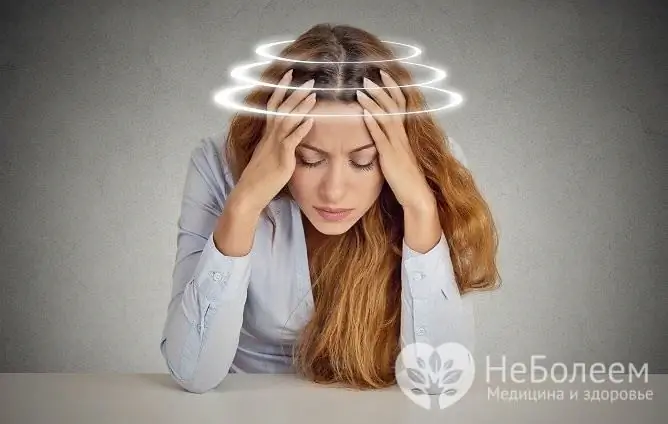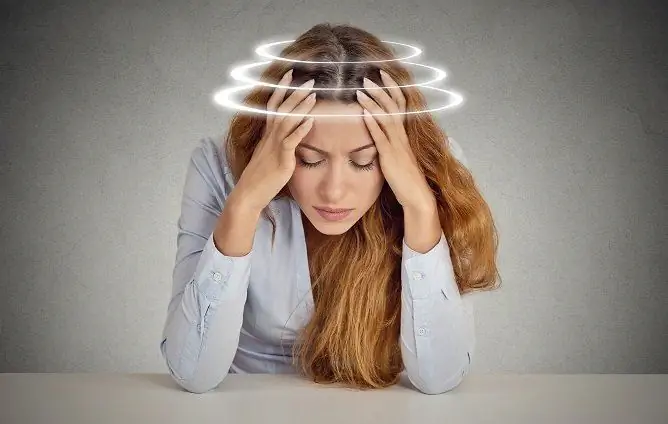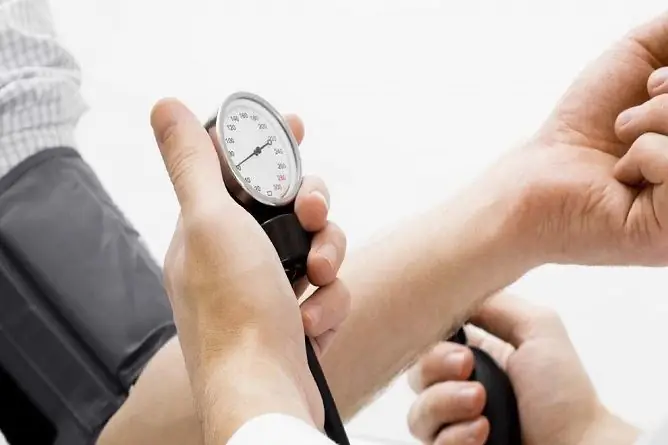- Author Rachel Wainwright wainwright@abchealthonline.com.
- Public 2023-12-15 07:39.
- Last modified 2025-11-02 20:14.
Dizziness with normal pressure: causes in women and men, accompanying signs, treatment
The content of the article:
- Why dizzy at normal pressure
- Features of dizziness in various pathologies
- The need for diagnosis
- What to do if you feel dizzy with normal blood pressure
- Prevention
- Video
Dizziness at normal pressure in a person can be observed with neurological, cardiovascular diseases, disorders of the organ of vision or the middle ear. Also, it may not be a sign of pathology, but be explained by physiological reasons.

Dizziness should alert if it recurs often and for no apparent reason
If this condition is repeated often, then first of all, you need to make sure that blood pressure is really normal, since often dizziness is the only sign of its increase or decrease.
In some cases, this condition, although not the norm, does not require treatment (for example, in patients with seasickness), but if it occurs frequently for no apparent reason, you should seek medical help.
Why dizzy at normal pressure
What makes your head spin? True dizziness, which is called vertigo, is associated with disturbances in the system of balance and control over the position of the body in space. With such violations, dizziness appears when the head is thrown back, bending forward, a sharp change in body position. It arises spontaneously, lasts no more than a minute and goes away on its own.
Disturbances from the vestibular apparatus can be caused by concussion, inflammation or injury of the middle ear (rupture of the tympanic membrane), inflammation of the inner ear, Meniere's disease (a non-suppurative disease of the inner ear, in which an increase in the volume of the labyrinth fluid occurs, from which dizziness develops), neoplasm of the brain, migraine, iron deficiency anemia, multiple sclerosis, epilepsy.
Frequent dizziness in older people may indicate the development of Parkinson's disease.
A common cause of dizziness at normal blood pressure levels is osteochondrosis, in which the cerebral circulation is impaired due to compression of the arteries that feed the brain.
Dizziness can appear with the uncontrolled use of a number of drugs (this is often observed when using sedatives or antibacterial drugs, women using hormonal drugs based on progesterone).
Overly emotional people can develop psychogenic dizziness, accompanying their experience of stressful situations.
The cause of dizziness at normal pressure in women can be a change in hormonal levels (pregnancy, menstrual irregularities, menopause).
Features of dizziness in various pathologies
Dizziness attacks against the background of osteochondrosis are usually prolonged, accompanied by the development of general weakness, darkening in the eyes, double vision of the objects being looked at, and loss of coordination.
In patients with pathologies of the vestibular apparatus with dizziness, nausea and vomiting, cold sweat, and impaired coordination of movements occur.
In patients with inflammatory diseases of the inner ear, hearing impairment (hearing loss from the side of the lesion, ringing in the ear) and discharge from the ear are usually observed.
In Meniere's disease, the patient usually has periodic attacks of dizziness, which are accompanied by nausea, ringing in the ears, impaired coordination of movements, increased sweating.
Dizziness against the background of brain tumors is accompanied by attacks of headache, aggravated in the morning and with a change in body position, decreased visual acuity, nausea and vomiting.
With psychogenic dizziness, the patient has anxiety, anxiety, feeling of lack of air, heaviness in the head, cold sweat, darkening before the eyes, there may be pain in the chest and / or abdomen, sore throat. This condition is more often manifested in women, although it can also occur in men, especially those who are excitable and emotional.
If dizziness develops due to a ruptured eardrum, a person experiences discomfort in the ear when sneezing, coughing and other sudden movements.
With dizziness against the background of pathologies of the digestive tract, the patient also has weakness, nausea, pain in the abdomen, and defecation disorders.
The need for diagnosis
In some cases, dizziness is the first symptom of a severe pathology, for example, a brain tumor or pre-stroke condition. Therefore, if it is repeated regularly for no apparent reason, a medical examination is necessary to confirm or exclude suspicions. Dizziness should be especially alert, which is manifested by darkening or a veil before the eyes, severe weakness, lasting more than 5 minutes, as well as that which is accompanied by a headache.
The basic examination includes a general and biochemical blood test, electrocardiographic examination, computed tomography and / or X-ray examination of the cervical spine, magnetic resonance imaging of the brain. Depending on the detected violations, additional studies may be assigned.
What to do if you feel dizzy with normal blood pressure
Treatment of vertigo, which occurs with normal blood pressure, begins only after the examination and diagnosis.
In many cases, special treatment is not required, it is enough to correct the lifestyle (to establish sleep, rest more, eat right, etc.) and exclude the influence of adverse factors. It is important to give up smoking and drinking alcohol when dizziness develops.
If a person has a dizziness attack at home, it is recommended to take a lying position. In this case, you should lie on a flat surface, legs should be raised above the level of the body. After the attack has passed, you can drink sweet tea with lemon, mint or linden tea, take a contrast shower.
In the event of an attack of dizziness outside the home, it is recommended to sit down, unfasten clothes that restrict the body, wipe your face with a damp cloth or cold water, and drink a sweet drink.

Dizziness is often accompanied by nausea and sometimes vomiting
If severe dizziness at normal blood pressure levels is accompanied by fainting, numbness of any part of the body, or speech disorders, it is recommended to call an ambulance, as these signs may indicate a stroke.
Any medications for severe dizziness should be prescribed by a doctor after undergoing an examination and finding out their cause. Depending on the indications, vestibulolytic agents, tranquilizers, neurometabolic stimulants, psychostimulants, antihistamines can be used.
For vertigo accompanied by nausea and vomiting, antiemetic agents may be used.
In some cases, drugs that improve the blood supply to the inner ear are indicated to eliminate dizziness and normalize coordination of movements.
Prevention
In order to prevent attacks of dizziness with normal blood pressure, it is necessary to timely treat diseases that can lead to the development of a pathological process, spend more time outdoors, eat right, lead a moderately active lifestyle, sleep at least eight hours a day, give up bad habits, eat properly.
Video
We offer for viewing a video on the topic of the article.

Anna Aksenova Medical journalist About the author
Education: 2004-2007 "First Kiev Medical College" specialty "Laboratory Diagnostics".
Found a mistake in the text? Select it and press Ctrl + Enter.






